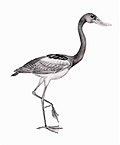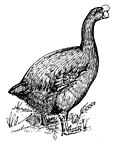Torrent duck
| Torrent duck | |
|---|---|

| |
| Female (left) and male Colombian torrent duck, Cañón del Río Anaime, Colombia | |
| Scientific classification | |
| Domain: | Eukaryota |
| Kingdom: | Animalia |
| Phylum: | Chordata |
| Class: | Aves |
| Order: | Anseriformes |
| Family: | Anatidae |
| Genus: | Merganetta Gould, 1842 |
| Species: | M. armata
|
| Binomial name | |
| Merganetta armata Gould, 1842
| |
| Subspecies | |
|
M. a. colombiana (Des Murs, 1845) | |

| |
The torrent duck (Merganetta armata) is a member of the duck, goose and swan family Anatidae. It is the only member of the genus Merganetta. It is placed in the shelduck subfamily Tadorninae after the "perching duck" assemblage to which it was formerly assigned was dissolved because it turned out to be paraphyletic.[2]
This 43–46-centimetre (17–18 in) long species is a resident breeder in the Andes of South America, nesting in small waterside caves and other sheltered spots. Like the blue duck, it holds territories on fast-flowing mountain rivers, usually above 1,500 metres (4,900 ft). It is a powerful swimmer and diver even in white water but is reluctant to fly more than short distances. It is not particularly wary when located.
Male torrent ducks have a striking black and white head and neck pattern and a red bill. In-flight, they show dark wings with green speculum. Females of all subspecies are smaller than the drakes; they have orange underparts and throat, with the head and upperparts grey and a yellower bill. Juveniles are pale grey above and whitish below.
The male's call is a shrill whistle, while the female's is a throatier whistle.
This is a declining species due to competition for its invertebrate food from introduced trout, pollution, forest destruction, and damming of mountain rivers for hydroelectric schemes. The Chilean population seems relatively stable, while the more northern ones are more seriously affected. However, the overall population is still large enough to warrant classification as a Species of Least Concern in the IUCN Redlist.
Subspecies
[edit]The subspecies taxonomy can be confusing. Males of the southern nominate subspecies M. a. armata, the Chilean torrent duck, have grey back and blackish underparts, with a chestnut belly. Males of the slightly smaller northern subspecies, the Colombian torrent duck, M. a. colombiana, are paler underneath, with streaked grey-brown underparts. Males of a third subspecies, the Peruvian torrent duck, M. a. leucogenis, are intermediate but very variable in plumage; some have entirely black underparts (turneri morph). Only males of the Chilean torrent duck have a black 'teardrop' mark beneath the eye. The Peruvian torrent duck is sometimes split into 4 subspecies (leucogenis, turneri, garleppi and berlepschi), but these are more likely simply color variations, as they are not limited to distinct areas.
-
Juvenile (left) and female Peruvian torrent duck on the Urubamba River, Peru
-
Male Peruvian torrent duck on the rocky banks of the Urubamba River, Peru
-
Male (top) and female Peruvian torrent duck, turneri morph
-
Male Chilean torrent duck near Fitz Roy, Argentina
-
Female Chilean torrent duck near Fitz Roy, Argentina
References
[edit]![]() Data related to Torrent Duck at Wikispecies
Data related to Torrent Duck at Wikispecies
![]() Media related to Torrent Duck at Wikimedia Commons
Media related to Torrent Duck at Wikimedia Commons
- ^ BirdLife International (2016). "Merganetta armata". IUCN Red List of Threatened Species. 2016: e.T22680118A92844656. doi:10.2305/IUCN.UK.2016-3.RLTS.T22680118A92844656.en. Retrieved 12 November 2021.
- ^ Livezey, Bradley C. (1986). "A phylogenetic analysis of recent anseriform genera using morphological characters" (PDF). Auk. 103 (4): 737–754. doi:10.1093/auk/103.4.737.
- Steve Madge; Hilary Burn (1988). Wildfowl. Christopher Helm. ISBN 978-0-7470-2201-5.
External links
[edit]- "Torrent ducks evolving in a strong waterstream (video)". Macaulay Library. 2024-01-03. Retrieved 2024-12-22.








